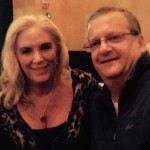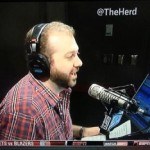There are a lot of people in the sports radio industry who assume that creating a national sports talk show is simple. How could it not be right?
After all, you can talk about anything you want, you work for a major network and receive tons of promotion, every team and agent gives you every guest you want, your hosts know everything there is to know about sports and need little guidance, and the show is carried all over the country by hundreds of radio stations. and the audience is so large that there’s never any danger of the program failing.
While there are many benefits that come from working on a national program, putting it together, and making it great is a lot harder than you think.
One thing I learned quickly when I worked in network radio between 2004-2006 is that having knowledge of how to do a lot of things in radio is nice, but truly being GREAT at one or two of them is much more important.
 I remember arriving at ESPN Radio and when my bosses Louise Cornetta and Dave Zaslowsky wanted me to work with my hosts on creating strong topics, and writing teases, I thought “that’s all you want me to do“?
I remember arriving at ESPN Radio and when my bosses Louise Cornetta and Dave Zaslowsky wanted me to work with my hosts on creating strong topics, and writing teases, I thought “that’s all you want me to do“?
I had worked in local radio prior to that for 6 years, and during that time I had hosted, booked guests, screened calls, ran boards, cut audio, reported, delivered updates, programmed a station and coached a small staff, and even sold advertising. Heck, there were times when I had to host my show and run the board while also screening phone calls.
I was so used to doing so many things (this occurs in a lot of local radio stations still today) that I felt I could pick up more slack. What I didn’t realize though, was that although I knew how to do many of those things, I hadn’t perfected many of them.
Being honest with myself, I realized that if I was a phenomenal talk show host, I’d be hosting on the network, not producing. I also knew my sound and ability to do updates were nowhere near the quality of incredible anchors like Jay Reynolds, Marc Kestecher, “The Duke” Dan Davis, and John Stashower.
When it came to producing, although I felt I had great instincts, a bulldog mentality to land guests, and a good idea of how to build a show and be creative, I still had yet to figure out what my strengths and weaknesses were.
I followed the advice of Dave and Louise, and started working alongside Ray Necci (who’s featured in this story), and concentrated a lot on improving my topic development, and teases. Ray was a tremendous teacher, and challenged me often, and I enjoyed it because we worked well together, and I could feel myself getting better.
 I discovered during this time that I had a knack for landing top notch guests, and I felt it was one way I could make a strong impression on my hosts and bosses. Anytime I produced a show, I wanted to create one moment in the program that was good enough to appear on SportsCenter or be the front page story on ESPN.com. While that didn’t happen every time, it was the goal each time I went to work.
I discovered during this time that I had a knack for landing top notch guests, and I felt it was one way I could make a strong impression on my hosts and bosses. Anytime I produced a show, I wanted to create one moment in the program that was good enough to appear on SportsCenter or be the front page story on ESPN.com. While that didn’t happen every time, it was the goal each time I went to work.
I was also lucky enough to work with some great personalities such as Dan Patrick, John Seibel, Chuck Wilson, Doug Gottlieb, Freddie Coleman, John Rooke and Amy Lawrence who trusted my instincts on guest booking, worked with me on building good topics, and either relied on my teases or took what I gave them and spun it into their own words to make it sound good.
I learned that to produce a national show successfully, you’ve got to be versatile, a great leader, and a manager who’s willing to delegate. Most national shows have a staff assigned to them, and everyone behind the scenes has a role. The producer works closely with the talent to strategize the program, and the support staff report to the producer to make sure they have what they need for the program to succeed.
Unlike local radio where some show plans get thrown together quickly and segments are built off of the audience’s reaction to a host’s monologue, most national programs have a very structured layout that has been created off of hours of discussion and preparation.
There’s conscious thought given to how often a major story gets discussed during a 3-4 hour show, guests are lined up based on what matters most that day, not who is available, and teases are written in advance to support the content and keep listeners engaged. Interviews may even be taped and edited to sound as tight as possible, and everyone is focused on the content and ready to change gears if something develops that warrants attention.
The challenges that many national shows face are something often beyond their control – changing the mindset of local sports radio operators, finding a way to become part of the local station instead of being seen as the show that originates from another part of the country, and having ratings success in certain markets while not performing as high in others.
Nobody has a playbook that can promise success, but when a national show is being added to a local sports radio station, I believe there are a few critical things that have to be analyzed to make sure it’s a good fit.
- Do the hosts focus a majority of their content on subjects that appeal to the local audience?
- How will the radio station localize the show so it sounds connected, not removed from the rest of the programming? This means using the liners wisely inside the show, having your talent talk about content from the show as if it was created by another local host on the radio station, creating promos that highlight the show’s coverage of local topics, and utilizing the same voice talent on the station that you’d hear during the national content.
- What are the national hosts willing to do to strengthen the bond with the station? Will they customize liners? Make client calls? Commit to a local appearance? Call-in to the other local shows? Conduct social media chats with local fans?
- How much salary is being saved by using a national program vs. local hosts, and is the ratings/sales end of the business going to benefit or suffer by going this route?
- Who is the local market sports radio competitor, where do they rank, and what mix of programming will give the radio station the best chance to win versus the competition?
 As someone who’s programmed stations with and without national programs, I can tell you that all of those factors play into decision making. While each station and market has its own unique challenges, network folks are trying to appeal to hundreds of stations, and they have to make calls based on what has mass appeal.
As someone who’s programmed stations with and without national programs, I can tell you that all of those factors play into decision making. While each station and market has its own unique challenges, network folks are trying to appeal to hundreds of stations, and they have to make calls based on what has mass appeal.
I felt it’d be helpful to gain an understanding of how some top national shows think and operate, and what their challenges are in creating a program that delivers content for the masses, but depends on distribution from local radio stations.
Each of these guys I’ve had the privilege of knowing for quite some time, and they’ve all had experience working with multiple high profile shows and personalities. They’re very good at what they do, and I believe you’ll gain some insight from their feedback below.
- Ray Necci – Multi-Platform Content Program Director at ESPN Radio – Also produced Mike and Mike, Tony Kornheiser, Dan Patrick, SVP & Russillo, and many other ESPN Radio shows during his sixteen year tenure with the network.
- Jon Goulet – Producer of “The Herd” with Colin Cowherd on FS1 and Fox Sports Radio – Previously worked with Colin at ESPN Radio plus served as Executive Producer of 95.7 The Game in San Francisco.
- Rob “Stats” Guerrera – Producer of “Pro Football Talk LIVE with Mike Florio” on NBC Sports Radio – Also served as Producer of “The Erik Kuselias Show” for NBC Sports Radio and spent close to seven years at ESPN Radio, including working with Mike and Mike.
What is the most fun part of producing a national sports talk show?
Goulet: I think it’s working with some of the most talented people in the industry. Host, producers, production people and management. They’re all people who bring incredible experience and talent to the show. It makes the show great and allows me to learn from them.
 Guerrera: The most fun part of producing a national show is the chance to shape the national conversation about the stories of the day. That isn’t to say that local shows don’t do that as well, but the bigger platform gives national shows a better chance to do that more consistently. I also like the freedom to discuss a wider range of topics rather than being obligated to concentrate on what is going on in any particular area of the country.
Guerrera: The most fun part of producing a national show is the chance to shape the national conversation about the stories of the day. That isn’t to say that local shows don’t do that as well, but the bigger platform gives national shows a better chance to do that more consistently. I also like the freedom to discuss a wider range of topics rather than being obligated to concentrate on what is going on in any particular area of the country.
Necci: The variety. You’ve got the entire world of sports to choose from, and it’s almost impossible to get bored.
What goes into producing your show each day and how many hours do you spend on it?
Guerrera: Nothing takes up a bigger portion of my day than communication. My host, Mike Florio, broadcasts from his home studio in West Virginia, so it’s like we’re doing a remote broadcast every day. Mike is also working on his website, ProFootballTalk.com, during the day, so we have to make the extra effort to make sure we’re on the same page for the day’s show.
Apart from that, for me it’s topic development. There’s nothing else more important. What are the angles to a story? How does it impact other people? What questions should we be asking the people in power? How does this mesh with what happened or what was said before? Our biggest determinate of success will always be how many people we can get on the end of that line, and how long we can keep them there. Compelling topics are how we do that.
 Necci: Putting an amount of time into producing a national show is almost impossible to answer. Part of this depends on the size of the staff involved. Working with Tony Kornheiser, there were two of us on the production team working on topic generation, production, bits, guest booking, sales obligations, etc. Working with Mike & Mike, we have more resources, but also many more obligations. Personally, I believe that you’re always working in some way towards the show. Whether it’s directly related to sports or if it’s elements of your life that could make good conversation on-air, you always have to keep the show in mind.
Necci: Putting an amount of time into producing a national show is almost impossible to answer. Part of this depends on the size of the staff involved. Working with Tony Kornheiser, there were two of us on the production team working on topic generation, production, bits, guest booking, sales obligations, etc. Working with Mike & Mike, we have more resources, but also many more obligations. Personally, I believe that you’re always working in some way towards the show. Whether it’s directly related to sports or if it’s elements of your life that could make good conversation on-air, you always have to keep the show in mind.
Most recently with Mike & Mike, I would be in the office 8-10 hours a day. This included prep, show execution, post show meetings, sales obligations, and preparation for future shows. Then in the afternoon/evening, everyone involved with the show would start exchanging guest ideas, stories and possible topics. This continued into the night as games were played. The specific responsibilities are divided between the producer, AP, PA, booker, etc. but it’s the responsibility of the producer to make sure everyone is meeting expectations.
Goulet: My main focus on The Herd is content. Since making the move to FOX, we have a much larger staff so I don’t have to worry about social media or promos. For the three hours leading up to the show I’m more of a writer than anything else. While I do produce some bits, cut audio, get music and do some podcasting, most of my time is focused on content.
How do you determine if a topic has broad enough appeal to a nationwide audience?
Necci: We usually start with what interests the hosts and the people on the show. Your passion will come across, and if your audience knows you’re interested, they may be willing to come along for the ride on something that doesn’t directly play in their backyard. There is also consideration placed on our key markets, and if you’re truly a national show, then that means being aware of the news in major cities across the different timezones.
 Goulet: The key is to find things that involve macro issues or teams. Things like major college football, the NFL, or LeBron work wherever you are. In the end it still comes down to how passionate your host is about a topic. If that passion involves something smaller or a less popular team, then we need to broaden that topic out so other fans can relate to it.
Goulet: The key is to find things that involve macro issues or teams. Things like major college football, the NFL, or LeBron work wherever you are. In the end it still comes down to how passionate your host is about a topic. If that passion involves something smaller or a less popular team, then we need to broaden that topic out so other fans can relate to it.
Guerrera: To me, there aren’t two separate categories of stories. Most of the time I don’t ask if a topic is broad enough for a national audience. I ask, “How do we make this topic broad enough for a national audience”? I have the luxury of working on an NFL show, which makes this part of the job easier. Fantasy football makes almost anything we do relevant nationally. Odell Beckham Jr.’s health last week wouldn’t have played outside of NY and Philadelphia years ago, but now it’s of great national interest because he’s on fantasy teams from sea to shining sea. That doesn’t mean we spend an entire segment on it, but it does mean the rules are a little different for us.
When creating the rundown for your show, how much of a focus do you place on targeting material that will appeal to your larger markets?
Goulet: It plays a big factor in determining what we discuss. Los Angeles is our biggest affiliate so we will look to find topics that appeal to that audience. You can’t force it though. If nothing is happening in a market you can’t pretend that it’s compelling.
Guerrera: Because we’re less than a year old, our markets are changing a lot throughout the the year. Right now my goal is to always appeal to the broadest part of the audience. If those stories interest the bigger markets, great, but I won’t force feed anything because it wouldn’t be authentic. A wise man once told me, you can’t out-local the locals.
 Necci: I like to think it’s something we consider, but we don’t let dictate our content. When the Mets & Cubs faced off in the NLCS, we may have slightly increased the time spent talking baseball, but the action on the field needs to be compelling. A better example may be when the Rangers & Kings met in the Stanley Cup Final. We don’t spend much time on the NHL during the long regular season, but when it’s important for our affiliates and the stakes are raised, we incorporate it into our plans. If there’s a conversation you plan to hit once and it involves the West Coast, we may try to do it later in the show to reach the most people. Also, as with most national shows, not every market takes the full four hour show, so that’s also something to consider.
Necci: I like to think it’s something we consider, but we don’t let dictate our content. When the Mets & Cubs faced off in the NLCS, we may have slightly increased the time spent talking baseball, but the action on the field needs to be compelling. A better example may be when the Rangers & Kings met in the Stanley Cup Final. We don’t spend much time on the NHL during the long regular season, but when it’s important for our affiliates and the stakes are raised, we incorporate it into our plans. If there’s a conversation you plan to hit once and it involves the West Coast, we may try to do it later in the show to reach the most people. Also, as with most national shows, not every market takes the full four hour show, so that’s also something to consider.
As it pertains to the creative process, who makes the final decision on what will be discussed and when?
Guerrera: Most of the time, what your talent is interested in is what’s good for the show. People respond to genuine passion. That said, if they’re really in love with a topic that’s out there, the producer must step in. You have to explain why doing, or not doing, a certain topic is good for the audience, and ultimately, good for the show. The hardest thing to get talent to buy into is submission to the listeners. We don’t do the show for our bosses, or our friends in the industry, and especially not for ourselves. We do it for the audience. When you put them first, the rest is easy.
Necci: I’m sure this is very different for every show. If a host’s name is on the show, they obviously feel that they’re putting themselves out there and should have the last word in the process. The most successful shows make those decisions together. I don’t believe in forcing a talent to discuss a topic, because that almost always comes across in the presentation, but there are times when you ask them to trust you and recognize your reasoning. Building that trust is essential. It takes time and often means taking risks. Every time you’re right, you take on more of the responsibility. Equally, when you’re wrong, you have to take the blame, and understand that the next time will be a bigger challenge.
 Goulet: Colin will always have final say on topics. He’s very open to suggestions and ideas, but in the end he’s the one who is doing them on the air. He is unique in that he doesn’t have teams of his own that he ends up circling back to, so we don’t have to try and steer him away from topics. He is generally interested in what the majority of the audience is interested in.
Goulet: Colin will always have final say on topics. He’s very open to suggestions and ideas, but in the end he’s the one who is doing them on the air. He is unique in that he doesn’t have teams of his own that he ends up circling back to, so we don’t have to try and steer him away from topics. He is generally interested in what the majority of the audience is interested in.
With television heavily involved in the reach, branding, and strategy of most programs and personalities, how do you separate what will be best for the radio show vs. what’s best for TV? When conflicts arise, how do you settle them?
Necci: In the past, the simulcasts I worked with were radio content first and TV followed along as much as they were able to. With Mike & Mike, we have made a major transition over the last 18 months towards merging the presentation. This is probably best reflected in my current position, Multi-Platform Content Director. With everything we do, we consider how it will play on all formats. We’ve increased communication, look to merge resources, and try to evolve the daily process to improve the overall brand. Obviously, that means compromise and not everyone involved will be thrilled by the decisions made, but we’re all working towards the same goal.
Goulet: As a radio producer I have to focus on radio. While I’ll make suggestions for TV or try and help with ideas, its not my main focus. There is an entire staff of more qualified people for that. Colin considers his show a radio show first, so radio always has the priority. I look at the TV side as a great way to reach other people. Since our show is new to FOX, we don’t have as many affiliates, so FS1 provides a great way for people in other markets to hear us.
 Guerrera: My host has both a popular website and a TV show on NBCSN, so he is definitely stretched pretty thin. I am lucky that most of the content translates across platforms fairly easily. If I start to notice that his focus is taking him too far away from radio, I have always found the best thing to do is have an honest conversation about it. I make sure to offer up a couple of different things that I can do to make radio easier, but it’s important to let your talent know when they need concentrate on the task at hand.
Guerrera: My host has both a popular website and a TV show on NBCSN, so he is definitely stretched pretty thin. I am lucky that most of the content translates across platforms fairly easily. If I start to notice that his focus is taking him too far away from radio, I have always found the best thing to do is have an honest conversation about it. I make sure to offer up a couple of different things that I can do to make radio easier, but it’s important to let your talent know when they need concentrate on the task at hand.
How difficult is it to measure the success of the show when certain local markets respond strongly and others don’t?
Goulet: The best way to figure out if your show is working is if you think it sounds good. On a national show there is no definitive rating that tells you everything. If we talk Lakers our ratings will go up in LA, but might go down in Portland because Blazer fans don’t like the Lakers. If we know the show sounds good, has interesting topics, and is getting a reaction, then that means we’re doing something right. The numbers we get are more indicative of the fundamentals like teasing and clock management.
Guerrera: Our show is so new (less than a year old) that we’re focusing on ourselves more right now. Are we doing things the right way? That said, I do try and check in with the PDs at the bigger stations at least once a month to get their take on the show. I’m always looking for smart people that disagree with me.
 Necci: This is obviously difficult because every affiliate you work with (understandably) is only worried about their most recent results. I’ve worked on national shows in the past where one hour in a key market dictated success or failure. It’s infuriating and insane. Few Program Directors are willing to invest time in growing an audience locally for a national show.
Necci: This is obviously difficult because every affiliate you work with (understandably) is only worried about their most recent results. I’ve worked on national shows in the past where one hour in a key market dictated success or failure. It’s infuriating and insane. Few Program Directors are willing to invest time in growing an audience locally for a national show.
Currently we mark our progress with overall impressions. How are we doing on terrestrial radio, television, and various digital medias. I’m still very interested in how we’re doing in individual markets, and want to help and try to assist when I can (communication, localization, TSL contests, affiliate calls, etc.), but the success of a program shouldn’t be decided by a guy who goes on vacation for a week or two and turns off his meter.
How big of a role do guests play in the daily creation of your show? Why is your strategy with guests set up the way that it is?
Guerrera: We operate under a very simple guest philosophy: Having no guest is better than a bad guest, or a guest for guest’s sake. Anyone we bring on has to add something to the conversation. If all they are is simply another person to talk to about a particular topic, you’re wasting everyone’s time.
Necci: I think guests are important for our show because people have come to expect “the biggest names” on ESPN and specifically Mike & Mike. That said, you should always be prepared to do a show with no guests, and many of the best/funniest/compelling moments come directly from the hosts. With our reach, and with the respect our hosts have earned, we offer a unique platform.
 Goulet: Guests are an important part of the show. Because we’re national that means bigger name guests are willing to come on. That also raises the bar. We have to think big when we book people because they have to appeal to a national audience. Local writers or analysts don’t always work nationally because rarely do we talk about just one team. In the end guests are still only 25% of a show.
Goulet: Guests are an important part of the show. Because we’re national that means bigger name guests are willing to come on. That also raises the bar. We have to think big when we book people because they have to appeal to a national audience. Local writers or analysts don’t always work nationally because rarely do we talk about just one team. In the end guests are still only 25% of a show.
Why do most national shows avoid taking calls? Should there be more/less or the same amount of caller interaction in shows going forward?
Necci: There isn’t one answer here. I’ve always wanted to avoid “opening up the phones” and turning the show over to the audience. To me, it feels lazy. Speaking in a very general sense, I think many feel that they’re paying a national host, and expect him to carry a segment without needing to rack a scripted 3-minute take.
I do though appreciate the value in well screened calls on a specific topic. When I worked with Tony Kornheiser, the audience consisted of regular characters/contributors to the show. With SVP & Russillo, we exploited the idea of “open calls” in a feature called “WHAT?!?” and encouraged intelligent chaos. Currently on Mike & Mike, our calls generally come through our “Chatter Line” where we ask a question and play back the best answers.
Goulet: Calls work much better locally than nationally. They’re great during controversy or a huge news story, but other than that they should be used sparingly. Nationally there are more topics to get into which means we don’t have to drag things out and we can just move on to other topics. I think callers from local markets get defensive about their teams when a national host criticizes them. This apparently causes them to call hosts morons, explain how little they know, and then scream “roll tide”.
 Guerrera: Calls are like umpires: You only notice the bad ones. Even if the person screening them does everything right, the caller could still be terrible on the air. More than that, though, when sports talk radio began phone calls were how we interacted with people who weren’t in the same room. Now, with Twitter, Facebook, Instagram, texts, etc., that isn’t the case anymore. We can interact faster and with more people now than we ever could over the phone. Basically, today’s technology has made calls obsolete.
Guerrera: Calls are like umpires: You only notice the bad ones. Even if the person screening them does everything right, the caller could still be terrible on the air. More than that, though, when sports talk radio began phone calls were how we interacted with people who weren’t in the same room. Now, with Twitter, Facebook, Instagram, texts, etc., that isn’t the case anymore. We can interact faster and with more people now than we ever could over the phone. Basically, today’s technology has made calls obsolete.
From where you sit, what can local stations do better to make a national program a heavier part of the radio station’s identity? What can your talent do better to make sure local stations succeed?
Goulet: Locals need to treat national programming as an asset not a detriment. They should talk about what the national host said just like they would another local host. Most importantly, don’t cut into national programming when a big local story breaks. A few years ago, “The Herd” got taken off the air in LA when a local team fired a coach. They decided to go with local programming. All that did was tell the audience that Colin wasn’t local. He was covering the story almost wall to wall anyway but nobody in LA heard it.
Guerrera: It takes buy-in from everyone. Stations need to actively make the shows and talent a part of their brand (including their website). The producer has to work with the local PD to create imaging and promos that are authentic to both sides (if you leave that up to the local market you won’t get truly authentic imaging). Finally, the talent has to do their part with liners, customized promos, and even guest appearances on that station’s local shows.
 Necci: In general, I don’t think people embrace what they have. Too often, I hear stations (on and off air) talk about their national & local shows. They are ALL your shows. Work with the show unit and the network to increase communication.
Necci: In general, I don’t think people embrace what they have. Too often, I hear stations (on and off air) talk about their national & local shows. They are ALL your shows. Work with the show unit and the network to increase communication.
Are you willing to work in localization with liners and production? Is there an event that the show should broadcast from? Would calls from the hosts to local shows or important clients help? I’m not saying every national host can do every request, but are you asking those questions?
Also, don’t assume you know a show because you sampled it when it launched several years ago. The best shows are always evolving. The Mike and Mike show you hear now is very different from what the show was 5, 10 or 15 years ago. The Scott Van Pelt Show that grew out of his work with Mike Tirico wasn’t the same show as SVP & Russillo (which was a very different show in its first few years than it was in the final few). The point is, be open to all your options.

Jason Barrett is the Founder and CEO of Barrett Media. The company launched in September 2015 and has provided consulting services to America’s top audio and video brands, while simultaneously covering the media industry at BarrettMedia.com, becoming a daily destination for media professionals. Prior to Barrett Media, Jason built and programmed 95.7 The Game in San Francisco, and 101 ESPN in St. Louis. He was also the first sports programmer for SportsTalk 950 in Philadelphia, which later became 97.5 The Fanatic. Barrett also led 590 The Fan KFNS in St. Louis, and ESPN 1340/1390 in Poughkeepsie, NY, and worked on-air and behind the scenes at 101.5 WPDH, WTBQ 1110AM, and WPYX 106.5. He also spent two years at ESPN Radio in Bristol, CT producing ‘The Dan Patrick Show’ and ‘GameNight’. JB can be reached on Twitter @SportsRadioPD or by email at Jason@BarrettMedia.com.




